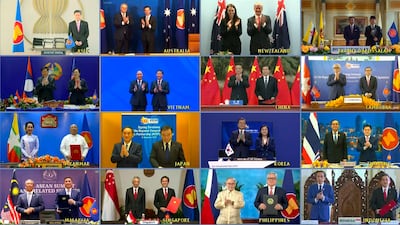It has been something of a lacklustre year for South-East Asia. The full reopening of economies and borders many had hoped for in 2021 never really transpired. This time last December my family and I returned to my home in Kuala Lumpur after a holiday we extended on the grounds that we didn’t know when we’d be able to take one again. Sure enough, lockdown restrictions began again in Malaysia in mid-January.
The island we’d visited, Langkawi, has welcomed only 376 foreign visitors since an international tourism travel bubble pilot was launched in November. Indonesia’s famed destination island, Bali, fared even worse: it had only 45 international travellers during the whole of 2021. February saw a coup in Myanmar that ended the country’s brief experiment with semi-democracy and unleashed a wave of military brutalities against civilians, even children, while the end of the year has been punctuated by the misery, deaths and homelessness caused by Typhoon Rai in the Philippines and severe flooding in Malaysia.
But there is some good news on the near horizon – the world’s biggest trade deal, the Regional Comprehensive Economic Partnership (RCEP), is due to come into force on January 1, 2022. Including the 10 members of the Association of South-East Asian Nations (Asean) plus China, South Korea, Japan, Australia and New Zealand. RCEP encompasses 2.2 billion people and nearly 30 per cent of global GDP.
It may seem remote, especially to those who have lost jobs due to the pandemic or property and possessions to natural disasters, but RCEP is expected to raise real global income by $186bn by 2030 and play a huge role in deepening and strengthening regional value chains, enhancing competitiveness and adherence to higher standards, and lowering carbon footprints.
It will eliminate up to 90 per cent of tariffs on goods traded within the group over the next 20 years, help harmonise non-tariff barriers (such as differences in food safety and labelling), and stimulate e-commerce and SME participation in international trade. RCEP is expected to drive economic recovery in Asean and has been described as a “new centre of gravity for global trade”.
A paper by the International Institute for Strategic Studies called RCEP “a significant geopolitical win for China” and claimed that “Beijing will use its economic heft as by far the region’s largest economy to exert influence on regulations and standards setting within the bloc”. This view – that RCEP is a triumph for China - and the implication, usually unsupported by any evidence, that there is something negative about Beijing having influence over trade rules, is common.

But it should be stressed that it is actually an Asean-led agreement that began life at the 2012 Asean summit in Phnom Penh and is administered by the association’s secretariat in Jakarta. That should serve to show that while Asean may be weak on some issues – for many years it has been pretty toothless on Myanmar, a member state since 1997 – it does have relevance. RCEP should be seen as a success for Asean, which with a combined population of 680 million and taken as a whole was already the fifth largest economy in the world by 2019, also has heft. The agreement should also be taken as a sign of agency on the part of regional countries. They can decide important matters for themselves, and they do not have to subscribe to a “you’re either with us or against us” binary when it comes to China and the US.
At the same time, China’s membership of RCEP as it goes into force could result in a number of blows to the US economy, from various goods becoming less competitive in Asia to America-based firms being shut out of supply chains. As Kelly Ann Shaw, deputy director of the National Economic Council under former US president Donald Trump, wrote recently, “If the Biden administration isn't panicked yet, it should be.” These are strong words, and there has been plenty of engagement by US President Joe Biden’s officials in the Asia-Pacific region (although Secretary of State Antony Blinken’s meetings keep getting cut short, once by a technical malfunction and more recently by a Covid case among his entourage).
But when it comes to trade, US efforts still look dismal. “America didn't show up in that region for four years,” said US Commerce Secretary Gina Raimondo earlier this month. Starting with Mr Trump’s withdrawal from the Trans-Pacific Partnership (TPP) trade deal – the centrepiece of his predecessor Barack Obama’s “pivot to Asia” – as virtually his first act in the Oval Office, Ms Raimondo was right. But she and her colleagues don’t seem to have an answer.
As Ms Shaw put it: “Currently under consideration is an Indo-Pacific digital trade deal, an idea that lacks ambition and reads like a consolation prize.” Referring to China’s application to join the TPP’s successor, she continued: “The optics alone of the US pursuing an 11-page digital deal while China simultaneously negotiates thousands of pages of rules covering all aspects of its trade relationship with the same CPTPP countries are demoralising.”
The Asia-Pacific region wants to move forward. Most countries – not all, to be sure, but most – are determinedly not ideological about this; they will work with anyone who is a willing partner. If the US still doesn't want to join regional pacts, even one it once championed, the choice and the consequences are both theirs.
After a pretty dismal year, on the other hand, South-East Asia can reflect that in 2022 it will be the agreement that it, through Asean, has nurtured, that will be the most significant new arrival in the world economy. That’s something to cheer, at least.


